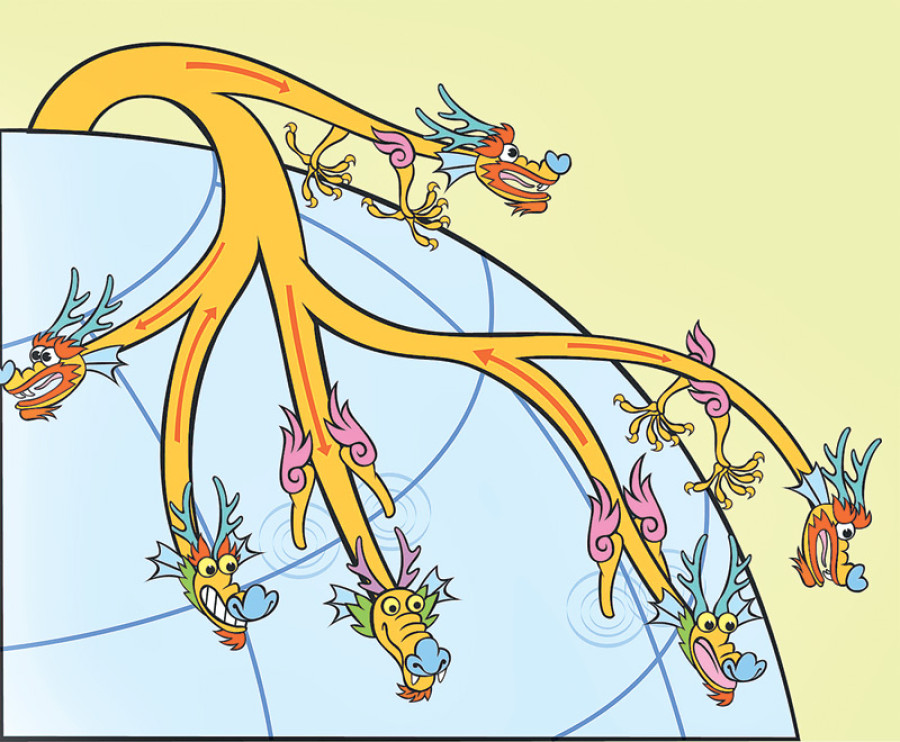Opinion
Enter the dragon
China won the hearts of Nepalis by promising to stand by Nepal in its darkest hour
Roshan Khadka
Prime Minister KP Sharma Oli’s visit to China was perceived as a celebration by the Nepali people as it differed from previous tours of the country’s prime ministers in multifold ways. It came following a series of momentous events in Nepal—a devastating earthquake, the promulgation of a new constitution, Tarai unrest and Indian blockade which dealt a direct blow to the economy. Nepal has a huge trade deficit with its neighbouring countries. According to Nepal Rastra Bank, the total trade deficit in 2014-15 amounted to Rs689.37 billion, up 10.8 percent from the previous year. This has increased the risk of capital flight as domestic investors may be prompted to put their money in foreign stocks for lack of opportunities at home.
Alongside these economic problems, Prime Minister Oli had to contend with diplomatic issues. India was not happy with a number of decisions made by the government. Oli weaponised nationalism and used it to redeem the government’s image, which aroused anti-Indian sentiments. These circumstances have forced a revision of the country’s conventional foreign affairs. Oli visited India with the hope of removing the gap in Indo-Nepal relations, and said that they needed to be handled with a forward looking approach. But the question that remains is how long it will take for things to recover.
Economic and non-economic trade
Timing is key in bilateral relations, and China won the hearts of the Nepali people with its perfect timing. The northern neighbour not only welcomed the new constitution, it also promised to stand by Nepal during its darkest hour. These factors overshadowed the closing of the Tatopani trade point on the northern border and the issue of an increment in oil taxes. Although there are still some who believe that political neutrality is vital for strengthening Nepal’s national interest, the country’s left-leaning parties have moved many steps ahead to harness the evolving ties with China by introducing an aggressive developmental agenda. China, which is one of the biggest economies in the world, has showed its willingness to support Nepal. This can benefit Nepal not only economically but also from the exchange of knowledge and technologies.
Nonetheless, the trade deficit with China swelled 51.5 percent in 2014-15, up 32.1 percent from 2013-14. We know that in order to strengthen economic trade, we need to boost non-economic trade too, and this is only possible when the people of the two countries interact with each other frequently. This can be facilitated greatly by enhancing efficient connectivity, and the trade and transit treaty with China is a big step forward. Prime Minister Oli’s visit has been very meaningful for Nepal in this regard.
Possible opportunities
Nepal’s remittance-based economy has few exportable products as it has focused on a small number of products and markets. It is unable to exploit the growth potential, especially when its neighbouring countries are turning into leading economies in the world. Nepal has a huge advantage in hydropower trade and tourism, but we need to implement some policy reforms to increase connectivity and trade and transit with China.
Enhancing connectivity and trade and transit with China will not only diversify imports but also open a competitive door for our potential hydro-based energy sector and provide a sustainable alternative to earn foreign currency by selling surplus power to both our neighbours. Prime Minister Oli has already set a milestone by signing an agreement with China for efficient connectivity and trade and transit. This will definitely have multiple long-term effects on the national economy and foreign affairs in the days to come.
Oli’s weeklong visit to China has taken our historical relationship to a greater height. This was extensively reflected in the major electronic and print media, which gave the visit wide coverage and large headlines. This visit has been widely welcomed by civil society, NGOs and the general public. The signing of bilateral cooperation deals with China has opened enormous opportunities for Nepal to achieve socio-economic development by enhancing not only government-to-government cooperation but also people-to-people cooperation by boosting tourism, construction of physical infrastructure and trade and commerce between the two countries.
Hurdles ahead
Connections with mainland China pass through Tibet, which is nine times bigger than Nepal in area but has a smaller economy. This poses a challenge since transportation infrastructure is not fully developed in Tibet. This problem needs to be resolved to facilitate the implementation of bilateral agreements. We might still have to wait for a few more years for an efficient mode of trade to become available. Transportation costs, delivery times and the language barrier are other aspects that we need to sort out in the future.
Another hurdle that needs to be overcome is ensuring a stable government in Nepal to guarantee security for foreign investments and production bases. Sticking with the commitments and keeping a balance with other bilateral partners are also important to implement the newly signed Nepal-China bilateral agreements. Being a landlocked country, keeping a delicate balance with India, which borders Nepal on three sides and has been our main development partner, and China is also a big diplomatic challenge.
Khadka is a Kathmandu-based journalist and executive editor at muldharnews.com




 20.53°C Kathmandu
20.53°C Kathmandu











